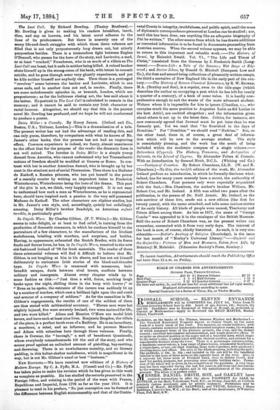NEW EDITIONS.—We have received new editions of A History of
Modern Europe. By C. A. Fyffe, M.A. (Cassell and Co.)—Mr. Fyffe has taken pains to make the revision which he has given to this work as complete as possible. He has studied the records preserved in the Foreign Office, and relating to the period of the wars with France, Republican and Imperial, from 1792 as far as the year 1814. It is pleasant to read in his preface, "No just conception can be formed of the difference between English statesmanship and that of the Contin- ental Courts in integrity, truthfulness, and public spirit, until the mass of diplomatic correspondence preserved at London can be studied ; nor, until this has been done, can anything like an adequate biography of Pitt be written." The other source from which he has drawn additions or corrected information is to be found in documents proceeding from Austrian sources. When the second volume appears, we may be able to return to this important and valuable work.—The History of Israel, by Heinrich Ewald. Vol. VI., "The Life and Times of Christ," translated from the German by J. Frederick Smith (Long- mans).—Dream-Life : a Tale of the Seasons ; Wet Days at Edg- wood ; and Doctor Johns, by Donald G. Mitchell (Sampson Low and Co.), the first and second being collections of pleasantly-written essays, the third a narrative of New England life in the early part of the cen- tury.--The History of Roman Classical Literature, by R. W. Browne, M.A. (Bentley and Son), is a reprint, even to the title-page (which describes the author as occupying a post which he has left for nearly a quarter of a century), of a book of some value. It is hardly com- prehensive enough to snit the wants of the more advanced student. Writers whom it is impossible for him to ignore (Claudian, e.g., who occupies mach the same position to Augustan Latin as did Lucian to the best Attic), are omitted altogether ; and the information given about others is not up to the latest date. Critics, for instance, are now commonly agreed that Juvenal must be put later than he was formerly put. Yet we read that "ha flourished in the days of Domitian." For " Domitian " we should read "Hadrian." But, on the other hand, there is, of course, a great deal of informa- tion which will be new to the average student. The style is remarkably pleasing, and the work has the merit of being included within the moderate compass of a single volume.— Saiaminia (Cyprus). The History, Treasures, and Antiquities of Salamis, in the Island of Cyprus. By Alexander- Palma di Cesnola. With an Introduction by Samuel Birch, D.C.L. (Whiting and Co.) —Vestiges of Creation. By Robert Chambers, LL.D. (W. and R. Chambers.)—:To this, the twelfth edition of the work, Mr. Alexander Ireland prefixes an introduction, in which he formally discloses what, indeed, has for many years scarcely been a secret, the authorship of Robert Chambers. Four persons only were especially acquainted with the fact,—Mrs. Chambers, the author's brother William, Mr. Robert Cox, and Mr. Ireland. A fifth was added two years after the publication, in the person of Dr. Neill Arnett. Mr. Ireland, as the sole survivor of these five, sends out a new edition (the first for twenty years), with the name attached, and tells some curious stories of its early history. All kinds of people were named, Thackeray and Prince Albert among them. As late as 1877, the name of "George Combo" was appended to it in the catalogue of the British Museum. Still the name of Robert Chambers was, as the present writer can remember, connected with it from very early days. The interest of the book is now, of coarse, chiefly historical. As such, it is very con- siderable.—Butler 's Analogy of Religion (Routledge), is the issue for last month of " Morley's Universal Library."—Gujartit and the Oujardtis : Pictures of Men and Manners, Taken from Life, by Behrimji M. Malabliri. (Education Society's Press, Bombay.)


































 Previous page
Previous page